|
|
|
Sort Order |
|
|
|
Items / Page
|
|
|
|
|
|
|
| Srl | Item |
| 1 |
ID:
124644
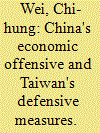

|
|
|
|
|
| Publication |
2013.
|
| Summary/Abstract |
This article explains how Taiwan's Democratic Progressive Party (DPP) administration was able to restrict cross-Strait fruit trade and resist China's "fruit offensive" in a democratic setting. During 2004-2005, China implemented various preferential policies for the importation of Taiwanese fruit and wooed Taiwanese farmers in the rural south, where political support for the DPP was concentrated. However, trade statistics show that cross-Strait fruit trade only increased slightly, making up just 4 or 5 per cent of Taiwan's total fruit exports during 2005-2008. I argue that focusing solely on regime type ignores the formal and informal policy instruments a democratic state can wield to manage its commercial ties with, and resist economic offensives from, other states. Cross-Strait fruit trade was limited because the DPP used legal as well as corporatist informal policy instruments to resist China's fruit offensive. I conclude that state-society institutional relations explain cross-Strait economic relations and economic statecraft better than regime type alone.
|
|
|
|
|
|
|
|
|
|
|
|
|
|
|
|
| 2 |
ID:
165081
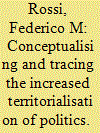

|
|
|
|
|
| Summary/Abstract |
The territorialisation of politics is a crucial transformation in state–society relations that has implications on how contemporary politics works. Defined here as the dispute for the physical control of space, be it a municipality, province or portion of land, within one or more politically constituted entities. It does not mean the emergence of a new regime type, but the process through which the territory re-emerges as a new cleavage after neoliberal reforms and authoritarian regimes have weakened/dissolved neo-corporatist arrangements for the resolution of socio-political conflicts in society. It is a cleavage because central political divisions are produced as a result of the physical encounter of or distance between political actors and of the dispute for the control of a territory for sociopolitical goals and causes that are not always territorially defined. Departing from this definition, I also raise potential explanatory hypotheses for the transformations that favoured this transformation in Argentina.
|
|
|
|
|
|
|
|
|
|
|
|
|
|
|
|
| 3 |
ID:
070523


|
|
|
| 4 |
ID:
105069
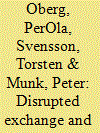

|
|
|
| 5 |
ID:
162352
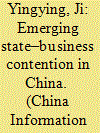

|
|
|
|
|
| Summary/Abstract |
Based on an in-depth case study of a business association, this article explores how private entrepreneurs are organizing for their rights and highlights contentious facets of the state–business relationship in China. In contrast to depictions common in the literature, this business association actively asserts and seeks to maintain its autonomy vis-a-vis the state and uses innovative strategies to strengthen its own organizational cohesion. It organizes collective actions to defend members’ interests and to enhance the transparency and accountability of the local government. It even advances universal values, such as equal rights to justice. Importantly, however, the initiation and effects of collective actions are contingent on the opportunities embedded in China’s fragmented governance structure. I argue that corporatist analyses characterizing Chinese business associations as lacking autonomy and as partners of the state have overlooked such associations’ potential to engage in confrontations with the state. Combining involvement in the formal institution and contentious collective actions, the association studied displays the tension between the incorporation system and social resistance in contemporary China.
|
|
|
|
|
|
|
|
|
|
|
|
|
|
|
|
| 6 |
ID:
114651
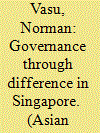

|
|
|
|
|
| Publication |
2012.
|
| Summary/Abstract |
Although the normative ideal of multiculturalism is the accommodation of communal
differences, Singaporean multiculturalism is instead integral to a corporatist form of
governance. This article argues that an emerging Singaporean-ness antithetical to the
necessary inter-communal divisions required for corporatism poses a strong challenge
to the manner in which the city-state is governed.
|
|
|
|
|
|
|
|
|
|
|
|
|
|
|
|
| 7 |
ID:
173638


|
|
|
|
|
| Summary/Abstract |
Recent years have seen a revival of debates about the role of business and the sources of business power in postindustrial political economies. Scholarly accounts commonly distinguish between structural sources of business power, connected to its privileged position in capitalist economies, and instrumental sources, related to direct forms of lobbying by business actors. The authors argue that this distinction overlooks an important third source of business power, which they conceptualize as institutional business power. Institutional business power results when state actors delegate public functions to private business actors. Over time, through policy feedback and lock-in effects, institutional business power contributes to an asymmetrical dependence of the state on the continued commitment of private business actors. This article elaborates the theoretical argument behind this claim, providing empirical examples of growing institutional business power in education in Germany, Sweden, and the United States.
|
|
|
|
|
|
|
|
|
|
|
|
|
|
|
|
| 8 |
ID:
111502
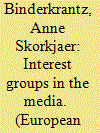

|
|
|
|
|
| Publication |
2012.
|
| Summary/Abstract |
A prominent presence in the news media is important for interest groups. This article investigates the development in the diversity of interest group media attention over time. The analysis draws on a dataset of 19,000 group appearances in the Danish news media in the period 1984-2003. It demonstrates how diversity has risen continually over time, leading to a media agenda less dominated by labour and business and more by public interest groups and sectional groups. This development is related to the increasing political importance of the news media and the decline in group integration in public decision-making processes. The article also shows how the development of group appearances is closely related to changes in media attention towards different policy areas.
|
|
|
|
|
|
|
|
|
|
|
|
|
|
|
|
| 9 |
ID:
097225


|
|
|
| 10 |
ID:
134306
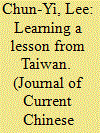

|
|
|
|
|
| Summary/Abstract |
This paper argues that the comparison of labour policies in Taiwan and China has an important bearing on the interaction between state and society. The fact that labour policies have changed over time illustrates a process of bargaining between the state and society. The core question of this paper is whether the development of labour policies in Taiwan can provide China a good example to learn from. In order to answer this question more systematically, the first part of this paper provides theoretical reviews of the state–society relationship, while the second part aims to verify whether those labour-favouring policies in Taiwan have changed under a different party’s governance. The third part of the paper further investigates labour policy in China; this section mainly focuses on the historical background to the new labour contract law. Based on the preceding two sections’ literature review of the changing path of labour policies, the fourth section scrutinises fundamental issues reflected in the development of Taiwan’s labour policies, then compares how those issues are reflected in the case of China. The conclusion of this paper is that although Taiwan, like China, formerly had a one-party system, the changes in Taiwan’s labour policies are not completely comparable to China, though both societies had some similarities.
|
|
|
|
|
|
|
|
|
|
|
|
|
|
|
|
| 11 |
ID:
101316
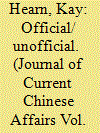

|
|
|
|
|
| Publication |
2010.
|
| Summary/Abstract |
This paper explores the debates around civil society and corporatism as ways of understanding changes in social association, including non-governmental organisations and protest groups, and information management in relation to the development of the Internet. Both concepts have been used to examine the changes that have taken place since the implementation of the Open Door Policy and more recently the development of the Internet, and have shed light on the way in which new forms of social association operate, and on their relationship to the government. However, both concepts tend to be deterministic and reductionist positions. Instead, I use a centre-margin analysis based on medium theory to explore the relationship between the state and society as a way of shedding light on the interaction between the government and NGOs and on how the state manages the flow of information in order to shape public discourse.
|
|
|
|
|
|
|
|
|
|
|
|
|
|
|
|
| 12 |
ID:
192275
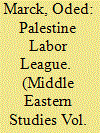

|
|
|
|
|
| Summary/Abstract |
This article explores the history of the Palestine Labor League (PLL) during the first years after Israel's establishment (1948-1953). Unlike most research, which views the PLL as an insignificant appendage to the major Zionist labor union, the Histadrut, this article wishes to investigate the PLL as a Palestinian organization operating within the corporatist industrial relations system of Israel’s early days. The article shows that PLL activists identified their position as a link between the Histadrut and the Palestinian population and used it to gain personal and collective achievements. The article therefore argues that the Israeli corporatist model, which was set to maintain social order and strengthen Zionist hegemony, unwittingly provided Palestinians with agency which was utilized by them to resist Israel's settler-colonial policies.
|
|
|
|
|
|
|
|
|
|
|
|
|
|
|
|
| 13 |
ID:
087691
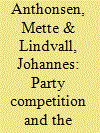

|
|
|
|
|
| Publication |
2009.
|
| Summary/Abstract |
This article argues that after the Golden Age of capitalism, corporatist methods of policy-making have come to depend on specific modes of party competition. In contrast to previous studies of corporatism, which have argued that corporatism depends on strong social democratic parties, this article suggests that the competition between well-defined left-wing and right-wing 'blocs' has become detrimental to corporatism. In countries with mixed governments or traditions of power-sharing, on the other hand, corporatism thrives. These conclusions are based on a comparison of four traditionally corporatist countries - Denmark, the Netherlands, Sweden and Switzerland - from the early 1970s to the late 1990s.
|
|
|
|
|
|
|
|
|
|
|
|
|
|
|
|
|
|
|
|
|